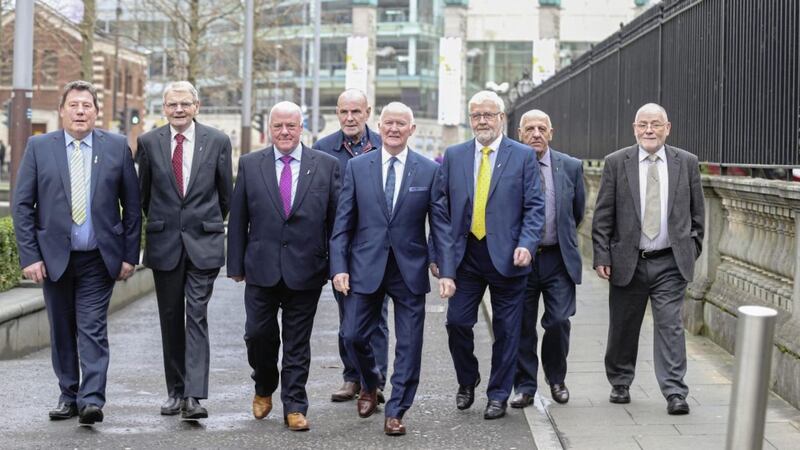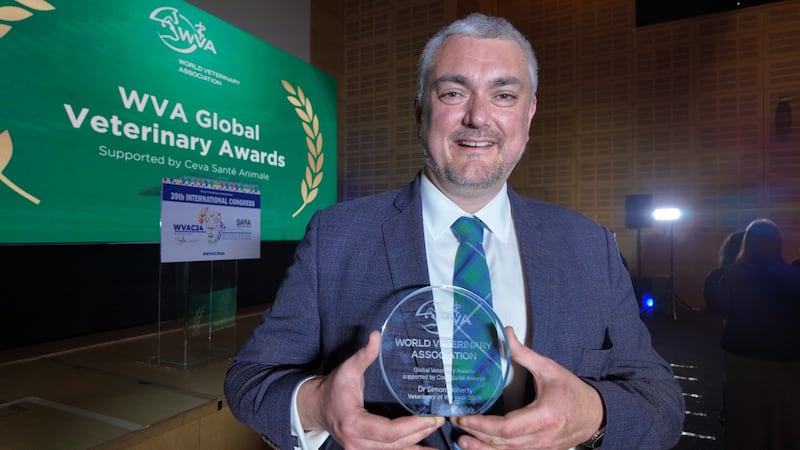A POLICE decision to end preliminary inquiries into suspected British government sanctioned torture of 14 men during internment is to be quashed, a High Court judge ruled today.
Mr Justice Maguire held that research undertaken to establish any criminality around their deep interrogation in 1971 had been too narrow and lacked focus, describing the situation as "a sorry state of affairs".
But he rejected related claims that the State was in breach of a legal obligation to carry out a full and independent investigation into the so-called Hooded Men's treatment - because the events occurred decades before human rights legislation came into force.
The verdict leaves the PSNI facing a fresh process on how to handle allegations of ministerial involvement which emerged in a 2014 television documentary.
The judge said: "The decision, in effect, to end the inquiry at the point when it was made was seriously flawed and was inconsistent with the broad approach which the Chief Constable had adopted."
Surviving members of the Hooded Men issued proceedings against the Chief Constable, Secretary of State and the Department of Justice.
They argued the authorities have failed to comply with duties under the European Convention on Human Rights to properly probe and order a full inquiry into what happened to them while interned at British Army facilities in Ballykelly, Co Derry.
Amid claims the men's treatment was sanctioned by the State, the court heard former British Prime Minister Edward Heath was involved in the decision making process.
Stormont's prime minister at the time, Brian Faulkner, was also personally briefed on the deployment of the techniques, according to their case.
Five techniques were used against the men while they were held without trial: being hooded, made to stand spread-eagled in a stress position against a wall and beaten if they fell; forced to listen to constant loud static noise; and deprived of sleep, food and water.
RUC Special Branch officers were were said to have been taught the methods by soldiers but sought assurances of immunity from prosecution before carrying them out.
In a statement one of the group recalled collapsing and being punched in the stomach to revive him.
He said he was against the wall for three days, subjected to kicks or beatings every time he dropped to the ground or fell asleep.
The court was told he suffered hallucinations and prayed for death.
It was claimed that the group's treatment during the British government's internment programme was on the scale of a war crime.
Another of those allegedly tortured was bitten by a soldier's dog and had to drink from the animal's dish, according to legal representatives.
School caretaker Sean McKenna was also slammed into concrete posts and made to go barefoot after being taken from his Newry home in August 1971, it was claimed.
Lawyers for his daughter argued that the interrogation techniques "ruined" him and worsened a heart condition which led his death four years later at the age of 45.
Mary McKenna's legal challenge was heard alongside that brought by the other surviving members of the Hooded Men.
She was 14-years-old when her father and brother were both taken from their house by British soldiers.
His internment ended in May 1972, when he was released on medical grounds to enter a psychiatric hospital.
But the impact of being subjected to the five techniques caused his psychiatric break-down, according to his daughter.
Counsel for the Government and Chief Constable countered that the 1998 Human Rights Act, which came into force in 2000, has no retrospective powers.
He also insisted that a former British government minister who alleged predecessors had authorised torture in Northern Ireland later corrected his assessment.
The claim made by Merlyn Rees in a newly discovered memo was central to the case.
In 1977 Mr Rees, then Home Secretary, sent a letter to Prime Minister James Callaghan setting out his views on procedures deployed against the men, the court heard.
In the memo he states it was his view that "the decision to use methods of torture in Northern Ireland in 1971/72 was taken by ministers - in particular Lord Carrington, then Secretary of State for Defence".
The document, uncovered from the National Archives in London, featured in an RTE documentary in 2014 and led to questions being raised at the Northern Ireland Policing Board.
But it was argued that within weeks Mr Rees' assessment of the men's treatment was "modified" to having faced deep interrogation.
It was stressed that in 1978 the European Court of Human Rights held the techniques constituted inhuman and degrading treatment - but fell short of torture.
In his ruling, Mr Justice Maguire said: "It seems likely to the court that if the events here at issue were to be replicated today the outcome would probably be that the European Court of Human Rights would accept the description of torture in respect of these events as accurate."
However, he found that in domestic law no obligation can be held to operate under the Human Rights Act as the events long pre-date its existence.
Turning to the rationality of the PSNI's handling of the case following the RTE programme, the judge said an Historical Enquiries Team researcher who examined the National Archive documents decided the Rees memo did not substantiate any allegation that Lord Carrington had authorised torture.
A conclusion was reached to no useful purpose would be served by taking the matter further.
But the judge held that the probe should have been aimed at examining the more general issue of official authorisation of any unlawful and potentially criminal methods of deep interrogation.
"Given the narrowness of the inquiry which the researcher carried out, with the emphasis being placed so significantly on the use of the word 'torture' as its guiding light, it is perhaps not that surprising that a very limited outcome was arrived at," he said.
"The court will declare that the decision made on behalf of the PSNI in October 2014 - in effect to take no further steps to investigate the question of identifying and, if appropriate, prosecuting those responsible for criminal acts - should be quashed.
"This will mean this question should be revisited. The court will not be prescriptive as to how this issue should be taken forward."








